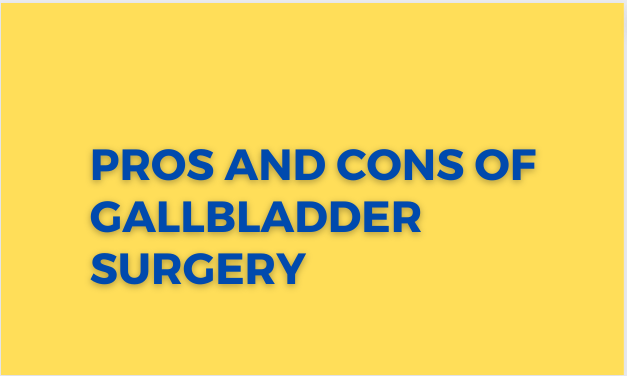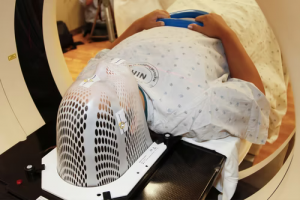Gallbladder surgery, also known as cholecystectomy, is a surgical procedure performed to remove the gallbladder. The gallbladder is an organ that stores bile produced by the liver. Here are pros and cons of gallbladder surgery:
Pros:
- Relief from Gallbladder Disease: Surgery effectively treats gallbladder conditions such as gallstones, gallbladder inflammation, and gallbladder polyps.
- Elimination of Gallstone-related Complications: Surgery reduces the risk of complications associated with gallstones, such as gallbladder infection, pancreatitis, and bile duct blockage.
- Improved Quality of Life: Removal of the gallbladder can relieve symptoms such as abdominal pain, nausea, vomiting, and digestive problems.
- Prevention of Recurrence: Surgery eliminates the possibility of recurrent gallstone-related episodes and their associated discomfort.
- Reduced Risk of Gallbladder Cancer: Removing the gallbladder eliminates the risk of developing gallbladder cancer, which is rare but associated with certain gallbladder conditions.
- Minimal Scarring: Laparoscopic surgery techniques result in small incisions, leading to less visible scarring and faster recovery.
- Shorter Hospital Stay: Laparoscopic cholecystectomy allows for shorter hospitalization compared to open surgery.
- Quicker Recovery Time: Laparoscopic surgery typically has a shorter recovery period, allowing patients to return to normal activities sooner.
- Lower Risk of Surgical Complications: Laparoscopic surgery is associated with a lower risk of surgical complications, such as wound infection and hernia formation.
- Less Pain and Discomfort: Laparoscopic surgery results in less postoperative pain and discomfort compared to open surgery.
- Outpatient Procedure: In some cases, gallbladder surgery can be performed as an outpatient procedure, allowing patients to go home the same day.
- Improved Digestive Function: After surgery, many individuals experience improved digestion and the ability to tolerate fatty foods better.
- Resolution of Digestive Symptoms: Surgery can alleviate symptoms such as bloating, gas, indigestion, and diarrhea caused by gallbladder disease.
- Decreased Risk of Gallbladder Inflammation: Removing the gallbladder prevents the development of gallbladder inflammation, known as cholecystitis.
- Peace of Mind: Surgery provides peace of mind by eliminating the constant worry and discomfort associated with gallbladder problems.
- Improved Nutrient Absorption: Removal of the gallbladder does not significantly affect nutrient absorption and overall nutritional status.
- Avoidance of Emergency Situations: Surgery prevents potential emergency situations, such as gallbladder rupture or obstruction.
- Reduced Risk of Complications during Pregnancy: Removal of the gallbladder before or during pregnancy reduces the risk of complications associated with gallbladder disease.
- Management of Gallbladder Polyps: Surgery is an effective treatment option for gallbladder polyps, which can potentially develop into cancer.
- Resolution of Jaundice: Surgery can resolve jaundice caused by bile duct blockage from gallstones.
Cons:
- Risks of Surgery: Gallbladder surgery, like any surgical procedure, carries risks such as bleeding, infection, and adverse reactions to anesthesia.
- Potential for Surgical Complications: Although rare, complications specific to gallbladder surgery include bile duct injury, bile leakage, and retained bile stones.
- Postoperative Pain and Discomfort: After surgery, some individuals may experience postoperative pain, discomfort, and fatigue.
- Digestive Changes: After gallbladder removal, some people may experience changes in bowel movements, including more frequent bowel movements or loose stools.
- Increased Risk of Diarrhea: Without the gallbladder’s storage and release function, bile may flow directly into the intestines, potentially causing diarrhea in some individuals.
- Bile Acid Malabsorption: A small percentage of people may develop bile acid malabsorption after gallbladder surgery, leading to chronic diarrhea.
- Adjustment to Dietary Changes: Individuals may need to make adjustments to their diet, including reducing fat intake, to manage postoperative digestive symptoms.
- Potential for Weight Gain: Some people may experience weight gain after gallbladder removal due to changes in bile metabolism and digestion.
- Scar Tissue Formation: In rare cases, scar tissue may develop after surgery, leading to abdominal adhesions that can cause pain or bowel obstruction.
- Delayed Recovery: Open gallbladder surgery may require a longer recovery period compared to laparoscopic surgery.
- Temporary Bloating and Gas: Some individuals may experience temporary bloating and gas as the body adjusts to the absence of the gallbladder.
- Risk of Injury to Surrounding Organs: Although rare, there is a risk of injury to nearby organs during surgery, such as the liver or intestines.
- Potential for Conversion to Open Surgery: In some cases, laparoscopic surgery may need to be converted to an open procedure due to technical difficulties or complications.
- Allergic Reactions or Medication Side Effects: Some individuals may experience allergic reactions to anesthesia or other medications used during surgery.
- Longer Operating Time: Open gallbladder surgery may require a longer operating time compared to laparoscopic surgery.
- Temporary Change in Gallbladder Function: Some people may experience temporary changes in gallbladder function immediately after surgery, leading to irregular bile flow.
- Possible Residual Gallstones: In rare cases, small gallstones may be left behind in the bile ducts, potentially causing future complications.
- Restrictions on Physical Activity: Following surgery, individuals may need to avoid certain physical activities or heavy lifting for a specified period.
- Cost of Surgery: Gallbladder surgery can be costly, including expenses related to hospitalization, surgery, anesthesia, and follow-up care.
- Personal Preference and Individual Circumstances: Whether or not to undergo gallbladder surgery is a personal decision that should consider individual circumstances, preferences, and medical advice.
Pros
- Relief from Gallbladder Disease
- Elimination of Gallstone-related Complications
- Improved Quality of Life
- Prevention of Recurrence
- Reduced Risk of Gallbladder Cancer
- Minimal Scarring
- Shorter Hospital Stay
- Quicker Recovery Time
- Lower Risk of Surgical Complications
- Less Pain and Discomfort
- Outpatient Procedure
- Improved Digestive Function
- Resolution of Digestive Symptoms
- Decreased Risk of Gallbladder Inflammation
- Peace of Mind
- Improved Nutrient Absorption
- Avoidance of Emergency Situations
- Reduced Risk of Complications during Pregnancy
- Management of Gallbladder Polyps
- Resolution of Jaundice
Cons
- Risks of Surgery
- Potential for Surgical Complications
- Postoperative Pain and Discomfort
- Digestive Changes
- Increased Risk of Diarrhea
- Bile Acid Malabsorption
- Adjustment to Dietary Changes
- Potential for Weight Gain
- Scar Tissue Formation
- Delayed Recovery
- Temporary Bloating and Gas
- Risk of Injury to Surrounding Organs
- Potential for Conversion to Open Surgery
- Allergic Reactions or Medication Side Effects
- Longer Operating Time
- Temporary Change in Gallbladder Function
- Possible Residual Gallstones
- Restrictions on Physical Activity
- Cost of Surgery
- Personal Preference and Individual Circumstances



